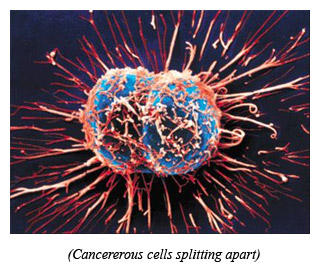Can Herpes Simplex Virus Cause Cancer?
The herpes simplex viruses, among the most ubiquitous, persistent and resistant of infectious organisms, are fast gaining notoriety as a cause of human illnesses. Indeed, every species of animal seems to have evolved with its own contingent of disease-causing herpes viruses, and few herpes infections in any species have thus far proved curable or preventable.
In fact, says Dr. Clyde Crumpacker of Harvard Medical School and Beth Israel Hospital in Boston, one of a legion of researchers currently battling these stubborn organisms, the five herpes viruses that infect human beings are now believed to cause more illness than any other group of viruses. Two members of the herpes family are leading suspects in research efforts to prove that herpes viruses cause human cancers, including cancer of the cervix.
Though herpes simplex virus is currently best known by name as the cause of a worldwide epidemic of venereal disease, this virus family plagues people of all ages and circumstances: The fetus may be devastated by cytomegalovirus, the child bespotted by chicken pox, the adolescent felled by infectious mononucleosis, the adult pestered by recurrent herpes cold sores, the aged agonized by herpes shingles.
 And unless some way is found to control the epidemic of genital herpes, which now affects one in five American adults, a dramatic increase is predicted in cervical abnormalities and cases of cervical cancer. An apparent increase in early cases of cervical cancer has already been noted by several gynecologists.
And unless some way is found to control the epidemic of genital herpes, which now affects one in five American adults, a dramatic increase is predicted in cervical abnormalities and cases of cervical cancer. An apparent increase in early cases of cervical cancer has already been noted by several gynecologists.”Each year, another half million cases of genital herpes are added to the 20-odd million already infected,” notes Dr. Fred Rapp, a microbiologist at Hershey Medical School and a leading herpes investigator. ”We will soon have 30 million cases, and the chances of getting infected by an occasional sexual partner keep increasing.”
According to Dr. Rapp, other characteristics responsible for the increased notoriety of herpes viruses and the difficulties researchers have in combating them include the following:
– All the herpes viruses can hide out in the body, apparently for life. At least three – the cold sore, genital herpes and chicken pox viruses – can re-emerge to cause recurrent infections.
– Although the first effective antiviral drug was developed against a herpes virus, there is still no cure for human herpes and no treatment for herpes can eradicate hidden herpes infections or prevent their recurrence. Treatment for herpes can ward off herpes-caused blindness and potentially deadly herpes encephalitis, but in the latter case, the herpes treatment itself can have devastating side effects.
– All five human herpes viruses have been shown in the laboratory to transform normal human cells into cancer cells, though proof that the viruses actually cause cancer in people is still indefinite. Two nonhuman herpes viruses are already established causes of cancer in animals: Marek’s disease, a lymphoma of chickens, and kidney cancer in leopard frogs. In addition to cervical cancer, in people herpes viruses are suspected causes of Burkitt’s lymphoma, nasopharyngeal carcinoma, and possibly also vulvar cancer, Kaposi’s sarcoma (which occurs primarily among homosexual men) and cancer of the prostate and bladder.
– Pieces of genetic material from genital herpes virus have been found in cancer cells of 40 to 50 percent of patients with cervical cancer, Dr. Rapp said. One study showed that women who married men whose first wives had cervical cancer themselves faced a three-tofour-times increased risk of developing the disease.
– Vaccines, which stimulate the production of antibodies to fight off infectious organisms, may not block latent or recurrent herpes or prevent herpes-triggered cancers. Recurrent infection and herpes associated cancers occur in people who are loaded with antibodies, which may keep the virus from causing a body-wide attack, but cannot prevent recurring herpes lesions. Nor would they keep the herpes simplex virus from transforming cells to cancer.
However, a successful herpes vaccine was developed against Marek’s disease of chickens, raising the hope that similar preventives might ward off initial herpes infections with human herpes viruses.



